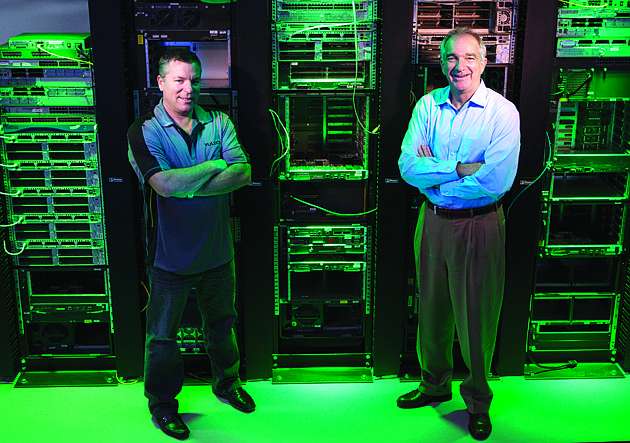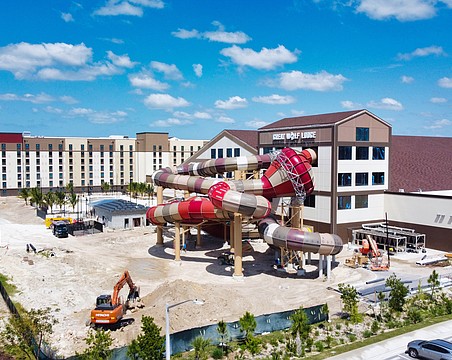When Peter Anderson, the CEO of Bayshore Technologies, was invited to lunch with Barry Shevlin, CEO of the tech firm Vology, he had no idea the event would change the course of his company, and his daily life.
Anderson, a former soccer player with the Tampa Bay Rowdies, and his two partners, ran a thriving company with $35 million in annual revenues, a business they founded 15 years earlier. Bayshore had become part of the fabric of Tampa Bay's burgeoning tech industry. It helped hospitals, schools, and businesses protect confidential records through virtual networks and storage. If a hurricane or fire struck, clients could swiftly recover data stored as far away as 1,000 miles.
Meanwhile, Shevlin, a onetime cable guy from New York, had built Vology into a powerhouse reseller of routers, switches and security devices for communication networks. He ignited revenues, taking the company from $1 million in 2002, to $90 million in revenues by 2012. But Shevlin knew his firm lacked the capability to be a full-service technology provider. It did not offer the virtual storage and expertise that would make it a formidable one-stop service provider. Vology needed to grow, strategically.
With their IT livelihood and an established relationship, the companies had a lot in common. But Bayshore enjoyed its niche. Even federal agencies called on the firm to secure their transmitted data. And Vology was charging ahead. Inc. Magazine has named it one of the fastest-growing U.S. companies seven years in a row.
It was Alex Sink, the former candidate for governor, and former chief financial officer for the state of Florida, who persuaded Anderson to accept the lunch invitation of John Hill, senior managing director of Hyde Park Capital Partners LLC. A Tampa investment banker known as a dealmaker, Hill has rung up more than $5 billion in mergers, acquisitions, equity and other transactions.
The trio — Shevlin, Hill, and Anderson — met at the Floridan Palace, a historic downtown Tampa hotel revived after decades of neglect in a costly labor of love by redeveloper Tony Markopoulos.
The lunch was scheduled to last an hour. “We ended up talking for three-and-a-half hours,” says Shevlin. “As we started talking about each of our strengths and weaknesses, it was pretty clear that the deeper we dug, the more obvious it was how complementary the two businesses were.”
Even though he had been a Bayshore customer for five years, and knew the firm's services and sterling reputation, Shevlin was cautious. He had had exploratory meetings with other firms at Hill's suggestion that did not fare well. And he had never had a lengthy conversation with Anderson. Most of his Bayshore dealings had been with Frank Mann, chief technology officer—a Bayshore founder, with Anderson and Winston DuBose, vice president.
Anderson knew something was up, though there was no stated agenda for the lunch. “You kind of have an idea if John invites you, and Barry's there, something—a partnership or something— is going to be discussed,” he says. But Anderson was in no rush to sell. Over the years, his firm had seen many suitors, and the partners rejected all offers to merge. From his view, Vology was a giant, with 8,000 active customers in 85 countries, while Bayshore had just 300 loyal regional clients.
What struck Anderson, though, and set the discussion apart from previous talks, was Shevlin's candor — laying it on the line about his failures and setbacks as well as his goals. “His truthfulness about his business — that resonated to me. He had some ups and downs. When a person's trying to sell you on their company, and they still have the ethics to tell you the complete truth, that tells me a lot about the relationship,” says Anderson.
By the time the lunch concluded, Anderson felt Shevlin was a man he could trust, and for the first time, he also felt that merging was the right thing to do. It wasn't just a matter of coming to terms over price — teams of accountants and auditors would determine the company's value, although both business leaders already were on the same page in terms of a ballpark figure, with Hill's prior calculations contributing to the basic accord.
But Anderson also worried about his 47 employees, many of whom had been with him from the beginning. It was their expertise and labor that had helped the firm grow. Shevlin assured him that his people would find a home at Vology, that Bayshore's operations would transfer under the Vology umbrella, and that the top managers, Anderson, Mann, and DuBose, would have meaningful roles in the expanded company.
Even before he left the meeting, Anderson says, he knew “It just felt right.” But the merger was by no means a done deal—he still had to talk it over with his partners, and decide whether to let go of the firm they had built, year by year. Accustomed to independence, they now had to open their doors to strangers—accountants and auditors who would pore over every line of their books.
Taking it to the partners
Before he took another step, Anderson brought the offer to his partners. “They are equal partners. We each have roles, and the business role has always been mine, the technical role Frank, and the sales role Winston,” Anderson says.
He has known Winston since 1978; he was a soccer teammate with the Rowdies. “He is our family. Our kids adore him. They've known him all their lives. My wife has known him for 22 years.” Frank, too, is part of the family, says Anderson. “Frank and Winston, if anything happened to me—they're trustees of our estate.”
They sat around a table as Frank and Winston listened. Anderson relayed the terms. Even though they had rejected earlier offers that didn't “feel right,” the three of them knew that one day they would sell the firm. “Half of us don't have children. I have a couple, but they are not involved in the IT industry,” says Anderson. One child is a college freshman, not drawn to technology, and the other, a seventh-grader. “This could be good for everybody,” Anderson told the men, and their reply was, “Yes, let's do it.”
His wife, Seretha, advised Anderson: “Go with your gut.” His instincts had served him well, and if selling the company would make him happy, she was 100% behind it.
What followed were breakfast discussions with Steve Torres, chief operating officer at Vology, the intense accounting examinations, and the valuation process. Although the basic deal was done with Shevlin, the process of integrating the two companies needed preparation, so it would unfold smoothly, once the deal was struck. “There are a lot of moving parts to a deal,” says Anderson. The negotiating and preparation went on for about three months.
And then it was done. “They've been very kind to call it a merger. But they bought Bayshore basically,” says Anderson. Under the new structure, Bayshore became a division. Anderson became senior vice president at Vology, reporting directly to Shevlin. The former Bayshore CEO is neither an owner nor a partner. “I'm an employee, just like everybody else.”
The preliminaries were handled quietly, with auditors and then attorneys carrying out their roles, and Hill involved in seeing the deal through. In a whirlwind week in late December, just after Christmas, the papers were signed, attesting that it was too late to turn back, and it was time to tell the employees.
Facing change
The Bayshore partners had a drink to salute the passing of their firm and herald the new order, but there was no time to celebrate. “We were all concerned about the way that we were going to tell our employees, and the timing,” says Anderson. On Dec. 28, the Friday before New Year's Eve, some employees were hunkered down with their families for the holiday.
It had always been difficult gathering the work force together, since so many tech specialists were on call or at customer sites. “I remember one Christmas, I wanted to take everybody to Busch gardens. I wanted everybody to just ride the roller coasters,” Anderson recalls. “Half the staff's beepers never stopped. Networks were down, customers were calling.”
On that last Friday in December, the partners first called in the eight most senior staff members who had been with the firm between 13 and 15 years. One by one, they told them the news, and awarded each a loyalty bonus. Next, they called in the remaining employees, and informed them. “We wanted to make sure everybody knew before they read it in the paper,” the Bayshore chief says.
The employees were supportive and said they trusted the owners' judgment. Then they began to ask questions — about benefits, and how they and their families would be affected by the ownership change. “We wrote down every question,” says Anderson.
Vology Human Resources Director Joan Gates and her team came to Bayshore and answered the questions, and by the following Friday, everyone was on the Vology payroll, and their benefits were covered, says Anderson.
In the aftermath, Shevlin is leading the search for a new headquarters for Vology, to bring all his 200 employees under one roof. Regarding the merger: Customers are pleased, he says.
Vology has become a power player in virtualization, so clients can store data in a cloud, or offsite data center, freeing up computer space. A security benefit is that a worker can't lose a laptop full of valuable data because it doesn't reside on the computer. Instead of investing in laptops, executives can access data on the go, using a smart phone app.
Rather than moving into new markets, Vology is deepening relationships with current clients, adding the network capabilities that Bayshore brought. And hiring new technicians to help.
For the Bayshore team, the goal now is to help Vology reach $250 million in revenue. “The IT spend in America is in the trillions, right?” says Anderson. “So a quarter of a billion dollars we should be able to do pretty easily.” Never mind that the two firms' combined revenues in 2012 were $125 million. “We're entrepreneurs, so we want ambitious goals,” says Anderson.
People ask if he feels sad about not owning the company anymore. They ask if it feels like he's given away a baby. “No,” he says. The decision still feels right. When he speaks of Vology now, he says “We.” He's looking forward, not back.
“I haven't had any seller's remorse. I have slept very well at night.”






